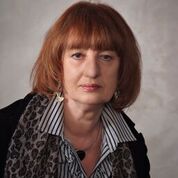Heeter: Not Lost in Translation

Technical Translator: German professor Heidemarie Heeter brought changes to the institute’s German technical translation program, helping students to translate technical and scientific articles and manuals from German into English. She also taught all four years of German courses on campus and helped escort student groups to Germany.
Heidemarie Heeter has always had good timing.
She started teaching German at Rose-Hulman the same year that East and West Germany were reunified, and a year after the Berlin Wall’s fall, helping students better appreciate the changing times happening in her home country.
Helping Rose-Hulman become globally connected, she was involved in developing study abroad programs with German universities, escorted trips to Germany, and encouraged students to have international experiences.
And now Heeter has decided to focus on retirement, family and friends.
“It’s time,” she says. “I have thoroughly enjoyed every day of my teaching tenure at Rose-Hulman. You want to go out at the right time. This just feels right.”
Heeter, raised and educated in Germany, taught Rose-Hulman students German language and culture for 27 years. She earned a doctorate at Indiana University, as a mature student raising a family and making the trip weekdays between her home in Indianapolis and IU’s Bloomington campus. She came to Rose-Hulman in 1990.
“Language is a dynamic field, and with the Berlin Wall coming down and German reunification, the 1990s were an exciting time to be a German professor,” she says. “People needed to put everything that was happening into an international context. Thankfully, I could help do that.”
Through the German technical translation program, Heeter helped nearly eight students annually become certified with a competency to comprehend and translate technical and scientific articles and manuals from German into English. She says the technical translator certificate complements and reinforces students’ professional knowledge and abilities, and increases their ability to work in the international marketplace.
“I don’t know anything about engineering and science. The translation program has been a two-way learning process: I was helping the students learn German and the students helped me learn about technology,” she says. “The technical translation program has helped several students get an important first step in working with global-based companies, or became helpful when traveling to Germany for business.”
Heeter also taught all four years of German courses on campus, advised students earning an academic minor in German studies, arranged and organized exchange programs with German universities in Stuttgart and Magdeburg, and twice helped escort student groups to Germany to visit landmarks and experience the country’s culture.
“Hopefully, I helped open a whole new world for the students and instilled a sense for culture abroad. There were broad international adventures, with many different cultures, for our students to explore and enjoy,” she remarks. “Learning a country’s language is just one piece. You need to put that language into a broader context about the people speaking and living that language every day.”
Heeter also specialized in 18th- and 19th-century German culture and comparative folklore, and had a research interest in women’s studies.

